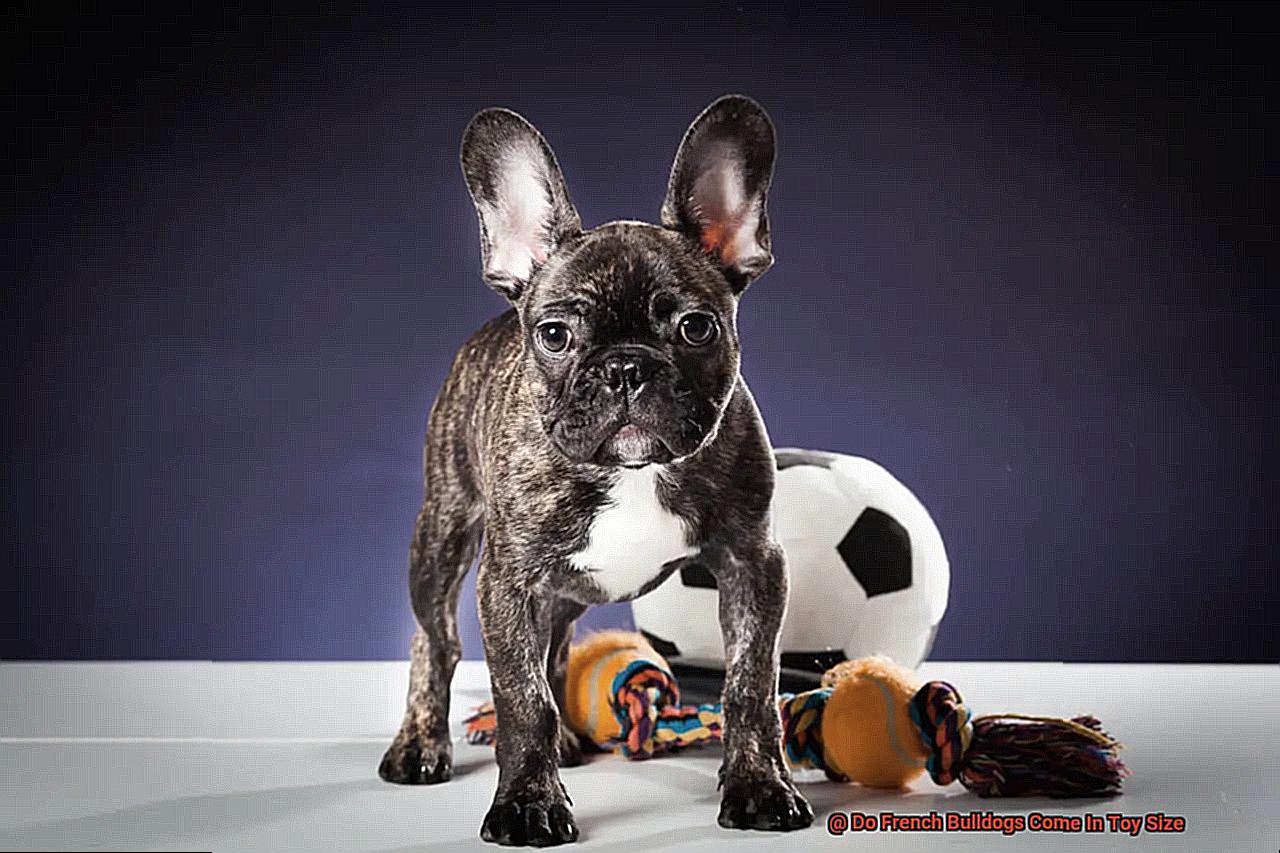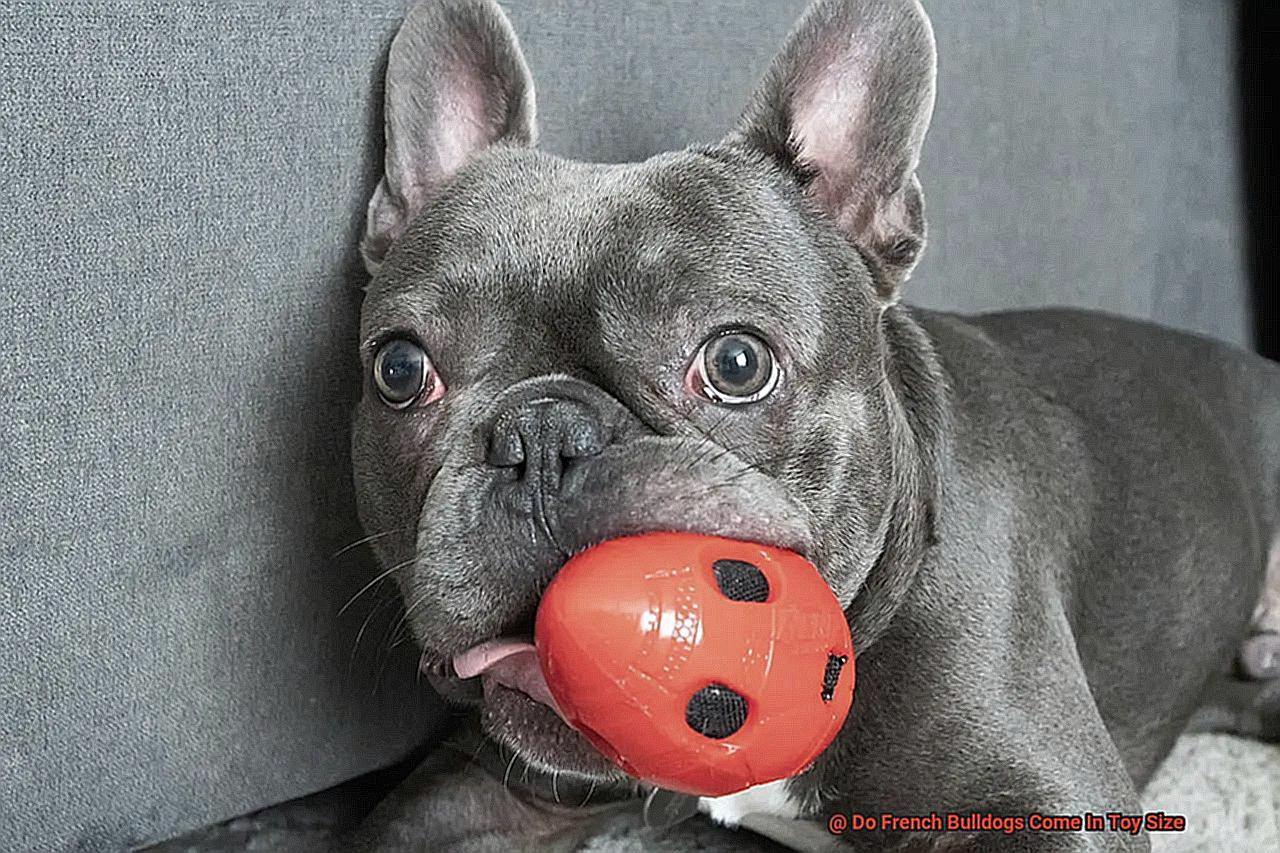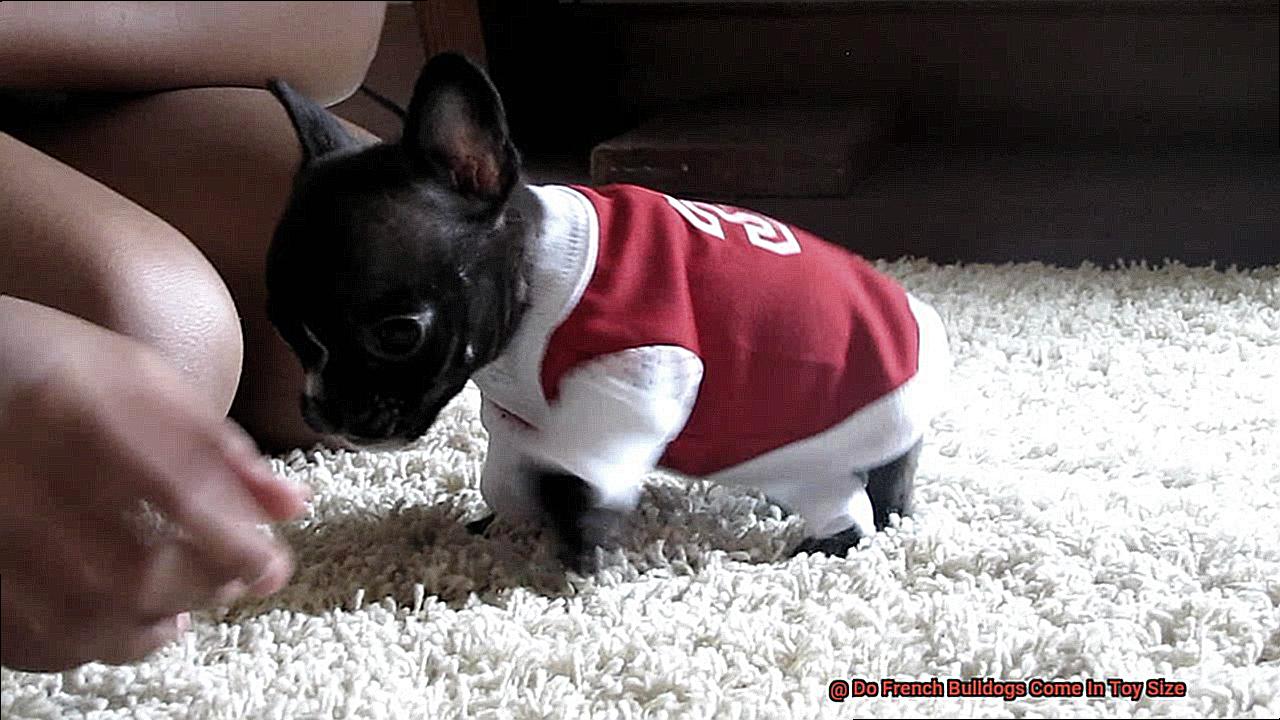Do French Bulldogs Come In Toy Size?
If you’ve fallen head over paws for the quirky and oh-so-cute French Bulldog breed, then you’re probably dying to know if these little furballs come in a teeny-tiny toy size. Picture it now: a pint-sized Frenchie that fits perfectly in the palm of your hand.
Well, my fellow canine enthusiasts, we’re about to embark on a quest to unravel the truth behind French Bulldog sizes. These charming pooches have skyrocketed in popularity lately, but their size variations still leave many scratching their heads.
So, grab a cuppa, get cozy, and let’s dive into the world of French Bulldogs to see if they truly come in a toy size or if it’s just a tall tale.
What Does the Breed Standard Say about French Bulldog Size?
Contents
- 1 What Does the Breed Standard Say about French Bulldog Size?
- 2 Are There Miniature or Teacup French Bulldogs?
- 3 The Risks of Intentionally Breeding for Smaller Sizes
- 4 Finding a Reputable Breeder for Your French Bulldog
- 5 Alternatives to Toy-Sized French Bulldogs
- 6 Factors to Consider When Choosing a Dog
- 7 Pros and Cons of Toy-Sized Dogs
- 8 Health Issues in Toy-Sized Dogs
- 9 Conclusion
French Bulldogs are beloved for their adorable appearance and charming personalities. If you’re a proud owner or considering getting one, understanding the breed standard for French Bulldog size is essential.
In this article, we’ll delve into the guidelines set by kennel clubs and breed associations, explore the recommended weight and height ranges, and provide valuable insights on size variations within the breed.
What Does the Breed Standard Say?
The American Kennel Club (AKC) and other kennel clubs worldwide provide detailed information on French Bulldog size. According to the AKC, male French Bulldogs should ideally weigh between 16-28 pounds, while females should range from 16-24 pounds. The height at the withers, the highest point of the shoulder blades, is typically around 11-12 inches.
Size Versatility:
While these ranges are preferred, it’s important to note that slight variations in size can still be considered acceptable. A French Bulldog that falls slightly outside these ranges may still possess all the other desirable traits outlined in the breed standard.
No “Toy” Size Category:
Contrary to popular belief, there is no official recognition of a “toy” size category for French Bulldogs within the breed standard. French Bulldogs are generally classified as a small breed but are not considered toy-sized like Chihuahuas or Yorkshire Terriers.
Health and Well-being Considerations:
It is crucial to prioritize the health and well-being of your French Bulldog over size preferences. Some breeders may advertise “teacup” or “miniature” French Bulldogs, claiming they are smaller than the standard size. However, these terms are not recognized by reputable breed organizations and can often be misleading.
Breeders who intentionally breed for smaller sizes may compromise their dogs’ health. Smaller French Bulldogs may be more prone to respiratory problems, joint disorders, and dental issues. When choosing a French Bulldog, it is recommended to find a reputable breeder who focuses on health, temperament, and adherence to the breed standard.
Are There Miniature or Teacup French Bulldogs?
When it comes to French Bulldogs, their compact size and irresistible charm have made them one of the most sought-after breeds. It’s no wonder that some people are curious about the existence of miniature or teacup French Bulldogs. However, it is important to approach these claims with caution and prioritize the health and well-being of these dogs.
The American Kennel Club (AKC), the leading authority on dog breeds, does not recognize a separate toy or teacup size for French Bulldogs. According to the AKC breed standard, French Bulldogs should weigh between 16-28 pounds and stand around 11-12 inches tall at the shoulder. This means that any claims of miniature or teacup French Bulldogs should be met with skepticism.
Breeding for extremely small sizes can lead to significant health problems in dogs. Some breeders may intentionally aim for smaller sizes by selectively breeding smaller parents or breeding runts. This can result in genetic abnormalities and a higher risk of health issues for these dogs. Responsible breeders prioritize the overall health and well-being of their dogs rather than focusing solely on size.
Miniature or teacup French Bulldogs may be prone to a range of health problems due to their small size. These can include respiratory issues, skeletal deformities, dental problems, and organ dysfunction. These health concerns can significantly impact their quality of life and require extensive veterinary care.
It is crucial for potential owners to understand that smaller-sized French Bulldogs are not officially recognized by reputable breed clubs or organizations. Buying a dog claiming to be a miniature or teacup French Bulldog may expose you to unethical breeding practices and potentially significant health risks for the dog.
If you are interested in owning a French Bulldog but prefer a smaller size, it is advisable to focus on finding a reputable breeder who prioritizes the health and well-being of their dogs. They can guide you in selecting a puppy that matches your preferences while ensuring you have a healthy and happy companion.
Remember, size should not be the sole factor when choosing a French Bulldog. Temperament, health, and compatibility with your lifestyle should be the primary considerations. A responsible breeder will provide you with all the necessary information about the breed and support you throughout the process of selecting and caring for your new furry friend.
The Risks of Intentionally Breeding for Smaller Sizes
The Risks of Intentionally Breeding for Smaller Sizes in French Bulldogs
If you’re a proud French Bulldog owner or considering adding one to your family, it’s crucial to be aware of the risks associated with intentionally breeding for smaller sizes. While those miniature or teacup French Bulldogs may seem irresistibly cute, they often come with significant health issues that can affect their overall well-being. In this section, we will explore the potential risks and complications that arise from breeding for smaller sizes, shedding light on why size should never be the sole factor when choosing a French Bulldog.
Skeletal Problems:
Breeding for smaller sizes often involves selecting dogs with shorter legs or a more compact body structure. Unfortunately, this can lead to various skeletal problems in French Bulldogs, including bone deformities and joint issues. The strain placed on their bones and joints due to their altered anatomy can result in conditions such as hip dysplasia, luxating patellas, and intervertebral disc disease.
Respiratory Difficulties:

French Bulldogs already have a predisposition to breathing difficulties due to their brachycephalic (short-faced) anatomy. Breeding for smaller sizes can exacerbate these issues further.
Smaller dogs may have narrower airways and more compressed nasal passages, making it even harder for them to breathe properly. This can lead to chronic snoring, wheezing, coughing, and exercise intolerance.
Increased Risk of Heart Problems:
Breeding for smaller sizes in French Bulldogs can also increase the risk of heart problems. Smaller dogs may have a higher incidence of heart defects or issues with their heart valves, leading to heart murmurs, arrhythmias, or congestive heart failure.
Reproductive Health Concerns:

The reproductive health of intentionally bred smaller French Bulldogs is also a concern. Breeding for smaller sizes often involves selecting females with narrower pelvic structures. This can make natural birthing difficult or even impossible, increasing the likelihood of cesarean sections being necessary for delivering puppies. This poses additional risks for both the mother and the puppies.
Impact on Lifespan and Quality of Life:
By focusing solely on size rather than prioritizing health and genetic diversity, breeders may inadvertently neglect other important traits. This can lead to a higher incidence of genetic disorders or compromised immune systems in smaller French Bulldogs, resulting in shorter lifespans and reduced ability to cope with common illnesses or environmental stressors.
Finding a Reputable Breeder for Your French Bulldog
You’ve decided that a French Bulldog is the perfect addition to your family. Great choice. But now comes the important task of finding a reputable breeder who will provide you with a healthy and well-adjusted pup. Here are some tips to help you in your quest:
Seek Recommendations from Trusted Sources
When it comes to finding a reputable breeder, word of mouth is invaluable. Ask your veterinarian, fellow dog owners, or breed-specific clubs and organizations for recommendations. These sources have firsthand experience and can provide valuable insights into breeders with good reputations.
Do Thorough Research

Once you have some potential breeders in mind, it’s time to do your homework. Look for breeders who are registered with reputable kennel clubs, such as the American Kennel Club (AKC), and who adhere to breed standards. This ensures that the breeder is committed to producing healthy and well-structured French Bulldogs.
Health Screening Tests
A reputable breeder will prioritize the health of their dogs and conduct various health screening tests on their breeding dogs. These tests can include hip and elbow evaluations, eye examinations, and genetic testing for common health issues in French Bulldogs, such as brachycephalic airway syndrome and allergies. Make sure the breeder is transparent about these tests and willing to provide you with the results.
Proper Socialization
Puppies need proper socialization from an early age to develop into well-adjusted adults. A good breeder will expose their puppies to different environments, sounds, and people to ensure they grow up confident and resilient. Ask the breeder about their socialization practices to ensure your future pup will be ready for the world.
Open Communication
A reputable breeder will be open and honest with you about their breeding program, the health of their dogs, and the upbringing of the puppies. They should be willing to answer any questions you have and provide references from previous buyers. If a breeder is evasive or reluctant to share information, it’s a red flag.
Avoid Pet Stores and Online Platforms
Steer clear of pet stores and online platforms that offer puppies without proper background checks or health guarantees. These sources often get their puppies from puppy mills or irresponsible breeders who prioritize profit over the well-being of the dogs. Take the time to visit the breeder in person and see the facilities where the dogs are kept.
Be Patient
Finding a French Bulldog from a reputable breeder may take time. Good breeders often have waiting lists, and it may be months before a suitable puppy becomes available. Remember, patience is key when looking for a well-bred and healthy French Bulldog.
Alternatives to Toy-Sized French Bulldogs
Are you in search of a furry companion that’s smaller than a standard French Bulldog but still packs a punch of cuteness and charm? While toy-sized French Bulldogs may not exist within the official breed standards, there are alternative options available for those seeking a smaller-sized dog within the French Bulldog breed. Let’s explore some of these alternatives and find the perfect fit for you and your family.
Miniature French Bulldogs: Bred with Care
If you’re looking for a smaller French Bulldog, consider exploring the world of miniature French Bulldogs. These dogs are bred to be smaller than the standard size but still fall within the accepted range according to breed standards. It’s important to note that breeding for smaller sizes can come with health risks, so it’s crucial to find a reputable breeder who prioritizes the health and well-being of their dogs. Researching and asking for recommendations from fellow French Bulldog owners can help you find a trusted breeder who produces healthy miniature French Bulldogs.
French Bulldog Mixes: A Blend of Charm
Another alternative to toy-sized French Bulldogs is adopting a mixed breed that includes French Bulldog genetics. Many shelters and rescue organizations have French Bulldog mixes available for adoption, and these mixed breeds can often have smaller sizes compared to purebred French Bulldogs. Adopting a mixed breed not only gives you a unique and lovable companion but also provides a home for a dog in need.
Considerations: Health, Lifestyle, and Compatibility
When searching for an alternative to a toy-sized French Bulldog, it’s important to keep in mind the specific needs and characteristics of the breed. French Bulldogs are known for their friendly and affectionate nature, as well as their love for human companionship. Regardless of size, finding a dog that fits well into your lifestyle and provides a loving and caring environment should be your top priority.
Additionally, it’s crucial to consider factors such as exercise requirements, grooming needs, and potential health issues when looking for an alternative to a toy-sized French Bulldog. Consulting with a veterinarian or a reputable breeder can provide valuable insights into these aspects and help you make an informed decision.
Factors to Consider When Choosing a Dog
Choosing a dog is an exciting and important decision. With so many breeds to choose from, it can be overwhelming to find the perfect furry companion. To make the process easier, here are some key factors to consider when selecting a dog:
- Size: The size of the dog should be compatible with your living arrangements and lifestyle. If you have limited space, a smaller breed may be more suitable. On the other hand, if you have a large yard or enjoy outdoor activities, a larger breed may be a better fit.
- Energy Level: Dogs vary in their energy levels, so it’s important to choose a dog that matches your activity level. If you lead an active lifestyle, consider breeds that require plenty of exercise and mental stimulation. If you prefer a more laid-back lifestyle, look for low-energy breeds.
- Grooming Needs: Each breed has different grooming requirements, so choose a breed that fits your grooming abilities and preferences. Consider how much time and effort you are willing to spend on grooming. Some breeds require regular brushing and professional grooming, while others have low-maintenance coats.
- Temperament: The temperament of a dog is crucial to ensure compatibility with your lifestyle and preferences. Some breeds are known for being friendly and outgoing, while others are more independent or reserved. Consider the breed’s compatibility with children or other pets if you have them.
- Trainability: If you want a dog that is easy to train and obedient, consider the breed’s trainability. Some breeds are highly trainable and eager to please, while others may be more stubborn or independent.
- Health Considerations: Research the health considerations associated with different breeds. Some breeds are prone to certain health issues, so understanding potential risks can help you make an informed decision.
Remember, each dog is an individual, and there can be variations within a breed. Take the time to research and meet different breeds to find the one that suits your lifestyle, preferences, and capabilities. Consulting with experts, such as breeders or veterinarians, can also provide valuable insights.
Pros and Cons of Toy-Sized Dogs
You’re considering getting a toy-sized dog, specifically a French Bulldog. These adorable little pups have stolen the hearts of many dog lovers with their unique looks and charming personalities. But before you make the leap, let’s take a closer look at the pros and cons of owning a toy-sized dog like a French Bulldog.
Pros of Toy-Sized Dogs:
- Portability: One of the biggest advantages of toy-sized dogs is their size. French Bulldogs are compact and easy to carry around, making them perfect for those who travel frequently or live in small spaces like apartments or condos. You can easily take them with you wherever you go.
- Lower exercise requirements: Toy-sized dogs generally have lower exercise needs compared to larger breeds. French Bulldogs, for example, still need regular exercise but can get by with shorter walks or indoor play sessions. This makes them a great fit for individuals or families with a less active lifestyle.
- Affordability: Smaller dogs typically require less food and medication than their larger counterparts, which can make them more affordable to care for in terms of ongoing expenses. This can be a significant factor to consider when budgeting for your furry friend.
- Companionship: Toy-sized dogs like French Bulldogs are known for forming strong bonds with their owners. They provide constant companionship and emotional support, making them great lap dogs and perfect for those seeking a loyal and affectionate friend.
Cons of Toy-Sized Dogs:
- Fragility: Due to their small size, toy-sized dogs are more delicate and prone to injuries compared to larger breeds. French Bulldogs, in particular, have a stocky build that can make them prone to respiratory issues and overheating. Additionally, they can easily be injured by accidental falls or rough play, so they may not be suitable for families with young children or households with larger pets.
- Health issues: French Bulldogs, like many toy-sized dog breeds, are predisposed to certain health problems. These can include dental issues, respiratory problems, luxating patellas (dislocated kneecaps), and heart conditions. These health issues may require frequent vet visits and special care, which can incur additional costs.
- Training challenges: Toy-sized dogs can sometimes be stubborn and difficult to train. French Bulldogs, in particular, are known for their independent nature, which can make training a bit more challenging. Patience, consistency, and positive reinforcement training methods are essential when working with these breeds.
- Shorter lifespan: Generally, toy-sized dogs have a shorter lifespan compared to larger breeds. This can be attributed to their smaller size, which may make them more prone to certain health issues and genetic disorders. It’s important to be aware of this when considering a toy-sized dog like a French Bulldog.
Health Issues in Toy-Sized Dogs
French Bulldogs are charming and popular companions, known for their distinctive looks and affectionate nature. However, like many toy-sized breeds, they are prone to certain health issues that owners should be aware of. In this article, we will explore the common health concerns in toy-sized dogs, with a focus on French Bulldogs. By understanding these issues, owners can take proactive steps to promote their furry friend’s well-being.
Dental Problems:
Small jaws in toy-sized dogs can lead to dental issues such as overcrowding, misalignment, tooth decay, and gum disease. Regular dental care is crucial to maintaining their oral health. This includes daily brushing using dog-specific toothpaste, providing appropriate chew toys to promote dental hygiene, and scheduling regular professional cleanings.
Respiratory Issues:
French Bulldogs have a unique anatomy with short snouts and compact airways, making them more susceptible to respiratory problems. Brachycephalic Airway Syndrome is a common condition that can cause difficulty breathing, snoring, and even collapse in severe cases. Owners should ensure a suitable environment for their French Bulldogs by avoiding extreme temperatures and strenuous activities.
Orthopedic Problems:
Toy-sized dogs, including French Bulldogs, may experience orthopedic issues like patellar luxation (knee joint dislocation) and hip dysplasia. These conditions can cause pain, lameness, and mobility problems. To reduce the risk of orthopedic problems, it is important to provide appropriate exercise tailored to their size and breed and maintain a balanced diet to prevent obesity.
Genetic Disorders:
Toy-sized dogs are more susceptible to certain genetic disorders such as heart conditions, eye problems, and skin allergies. Regular check-ups with a veterinarian are crucial for early detection and management of these conditions. Genetic testing can also be beneficial for breed-specific health concerns.
Conclusion
In conclusion, it is important to note that French Bulldogs do not come in toy size. Despite their small and adorable appearance, they are classified as a medium-sized breed. While there may be some individuals who are smaller than average, they should not be confused with being a toy breed.
It is crucial to consider the health and well-being of these dogs when discussing their size. Breeding French Bulldogs to be excessively small can lead to a range of health issues, including respiratory problems, joint disorders, and heart conditions. Responsible breeders prioritize the overall health of the dog rather than focusing solely on size.
French Bulldogs may be compact and petite, but they are full of personality and charm. Their playful nature and affectionate demeanor make them wonderful companions for individuals and families alike.
So while you won’t find a toy-sized French Bulldog, you can still enjoy all the love and joy they bring into your life.
Remember, when considering adding a French Bulldog to your family, always choose a reputable breeder who prioritizes the well-being of their dogs. By doing so, you ensure that you are getting a healthy and happy companion who will bring years of happiness into your home.




